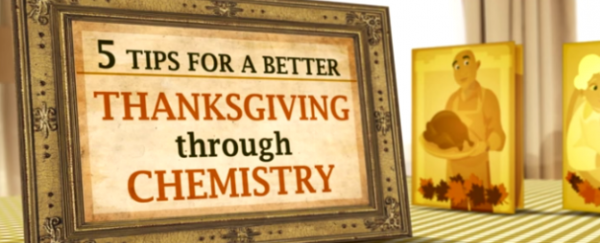The process of brining has pretty much transformed the average Thanksgiving turkey from cardboardy to… moistacular (that's a word, right?), but how exactly does it work? This pre-roasting step involves steeping your turkey in a cold salt bath for several hours before putting it in the oven, and somehow whatever happens in that bath prevents the bird from drying out as it cooks.
As US-based food writer, Harold McGee explains in the American Chemical Society video above, the secret comes down to simple osmosis:
"A liquid on the outside of the turkey meat that's high in salt will draw fluid out the turkey breast because the concentration of salt is higher outside than in, which you might think would actually dry the meat out, and that does happen for the first few hours that the turkey is in the brine. But after a while, because the turkey is also picking up some salt, osmosis works both ways in this case, so the presence of the salt in the turkey meat actually raises the water-holding capacity of the proteins inside the turkey."
We all know cranberries make the perfect accompaniment to turkey, which is great, because they also happen to be packed with antioxidants - chemical compounds that have been linked to anti- cancer and heart health benefits.
But research published in the Journal of Agricultural and Food Chemistry has found that the process commonly used to turn fresh cranberries into juice and sauce actually lowers the level of antioxidants in the berries. This is because when they're blanched - or heated up - for a few minutes in preparation, the process kills off a number of beneficial antioxidants called anthocyanins. And then when the cranberries are crushed and their skin and seeds are left behind, so too are many of the remaining antioxidant compounds.
That said, cooked and squished cranberries are still higher in antioxidants than many other fruits, so don't worry, Thanksgiving isn't ruined.
Although it might be if you go overboard with the American Chemical Society's advice to add garlic to your dinner to make it healthier. But guess what? Science even has a solution to garlic breath. According to Lindsey Kratochwill at Popular Science, you just need to eat an apple or sip on some green tea to break down all those objectionable sulphur-containing compounds.
Watch the video above to find out more chemistry-friendly Thanksgiving dinner tips, and remember to give thanks to these very special birds:
Sources: The American Chemical Society, Popular Science
